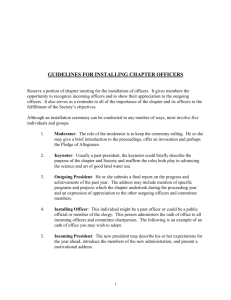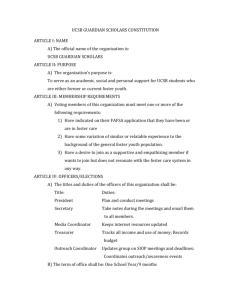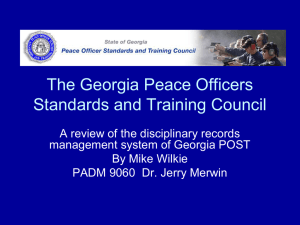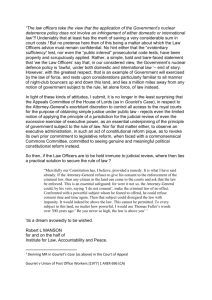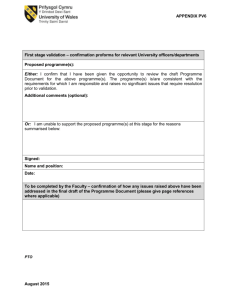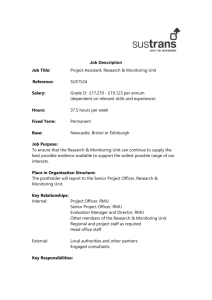Life After the Academy
advertisement
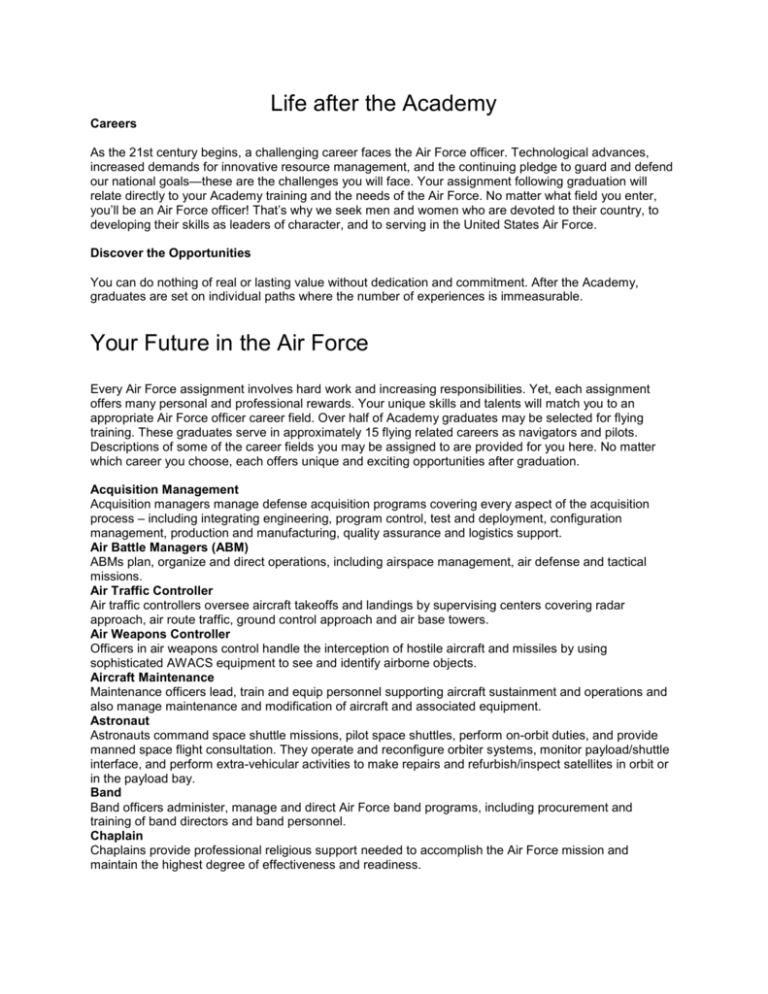
Life after the Academy Careers As the 21st century begins, a challenging career faces the Air Force officer. Technological advances, increased demands for innovative resource management, and the continuing pledge to guard and defend our national goals—these are the challenges you will face. Your assignment following graduation will relate directly to your Academy training and the needs of the Air Force. No matter what field you enter, you’ll be an Air Force officer! That’s why we seek men and women who are devoted to their country, to developing their skills as leaders of character, and to serving in the United States Air Force. Discover the Opportunities You can do nothing of real or lasting value without dedication and commitment. After the Academy, graduates are set on individual paths where the number of experiences is immeasurable. Your Future in the Air Force Every Air Force assignment involves hard work and increasing responsibilities. Yet, each assignment offers many personal and professional rewards. Your unique skills and talents will match you to an appropriate Air Force officer career field. Over half of Academy graduates may be selected for flying training. These graduates serve in approximately 15 flying related careers as navigators and pilots. Descriptions of some of the career fields you may be assigned to are provided for you here. No matter which career you choose, each offers unique and exciting opportunities after graduation. Acquisition Management Acquisition managers manage defense acquisition programs covering every aspect of the acquisition process – including integrating engineering, program control, test and deployment, configuration management, production and manufacturing, quality assurance and logistics support. Air Battle Managers (ABM) ABMs plan, organize and direct operations, including airspace management, air defense and tactical missions. Air Traffic Controller Air traffic controllers oversee aircraft takeoffs and landings by supervising centers covering radar approach, air route traffic, ground control approach and air base towers. Air Weapons Controller Officers in air weapons control handle the interception of hostile aircraft and missiles by using sophisticated AWACS equipment to see and identify airborne objects. Aircraft Maintenance Maintenance officers lead, train and equip personnel supporting aircraft sustainment and operations and also manage maintenance and modification of aircraft and associated equipment. Astronaut Astronauts command space shuttle missions, pilot space shuttles, perform on-orbit duties, and provide manned space flight consultation. They operate and reconfigure orbiter systems, monitor payload/shuttle interface, and perform extra-vehicular activities to make repairs and refurbish/inspect satellites in orbit or in the payload bay. Band Band officers administer, manage and direct Air Force band programs, including procurement and training of band directors and band personnel. Chaplain Chaplains provide professional religious support needed to accomplish the Air Force mission and maintain the highest degree of effectiveness and readiness. Combat Systems Officer (CSO) CSOs require tremendous efficiency, attention to detail and strong leadership skills. They’re the eyes of fellow Airmen and aviators, using high-tech equipment to ensure mission completion. They’re also responsible for training Airmen in their particular area of expertise. To learn more about career opportunities as a combat systems officer, browse through the following job descriptions. Command and Control Command and control officers perform and manage airfield operation functions and activities, including air traffic control (ATC), airfield management and base operations. Communications and Computers Communications computer officers are a part of an exciting process - tracing electrical impulses to a computer’s brain, fine-tuning aircraft navigational aids, or translating ideas for communications-computer systems into engineering specifications. They influence the day-to-day activities of nearly all Air Force organizations. Communications and Information Officers in this career field support joint and service communications and information (C&I) requirements to conduct operations across the air, space and cyberspace domains. They also conduct deployed communications operations, manage Air Force spectrum management-related matters, policy and procedures, and develop programs to perform Air Force, joint and allied missions. Contracting Contracting requires planning, organizing, managing and accomplishing contracting functions to provide supplies and services essential to Air Force daily operations and the war-fighting mission. Control and Recovery Control and recovery officers are part of an operational capability provided by dedicated forces to affect the recovery of isolated personnel during combat operations. Cost Analysis Cost analysts conduct studies to estimate cost and evaluate effectiveness of force structures, operational systems, acquisition programs and support activities. Engineer - Civil Civil engineers build and maintain the buildings and utilities that make up the Air Force’s infrastructure. They may specialize in several areas, and their duties may also include disposal of conventional, nuclear and chemical biological ordnance. Engineer - Developmental The developmental engineer specializes in engineering processes and subprocesses, formulates engineering policy and procedures, and coordinates and directs engineering and technical management activities and operations. Finance The Air Force finance officer performs financial duties and operations, including accounting liaison and pay services and budget preparation and execution. Intelligence Intelligence officers conduct information operations to include analysis of information vulnerability, intelligence collecting, exploiting and producing/disseminating foreign military threat information. Judge Advocate - JAG (Attorney) Judge advocates face an exciting variety of legal issues. Most Air Force base legal offices have three to 10 judge advocates, and while they advise many military people, one of their primary clients is the base commander. Accordingly, they encounter a limitless variety of legal issues, including criminal law, government contract law, labor law, environmental and real property law, international law and claims. Logistics The logistics utilization field encompasses all functions performed by logistics officers, including aircraft, missile and space lift maintenance. Supply, transportation and logistics plans. Logistics Readiness Logistics readiness officers integrate the spectrum of the logistics processes within the operational, acquisition and wholesale environments. Munitions and Missile Maintenance Officers in this career field manage maintenance and modification of conventional munitions, nuclear weapons and associated equipment. Operations Management As an operations management officer, planning and coordinating weapons and other combat resources for use are the main objectives. They operate command posts, implement higher headquarters policy, and plan and analyze training programs. Personnel and Manpower The name of the personnel game is taking care of Air Force people. Personnel and manpower officers perform and administer personnel programs, including procurement, professional development, classification, assignments, promotions, separations, personnel support for contingency operations (PERSCO) and personal affairs. Pilot Flying the most advanced aircraft in the world is only one of the many responsibilities associated with a career as an Air Force pilot. Leadership skills and character are of paramount importance as you take charge of training and commanding crews to accomplish missions. Each type of pilot specializes in different aircraft and skill sets. To learn more, browse through the following job descriptions. Planning and Programming In the planning and programming career officers develop and write Air Force, joint services and combined plans, programs and policies. Public Affairs This career field requires planning, budgeting for, executing and evaluating the effectiveness of public affairs programs and providing public affairs advice, counsel and support for commanders and senior staff members. Readiness Readiness officers are responsible for the integration of distribution, materiel management and contingency operations within the operational, acquisition and wholesale environments. Science and Engineering Our engineers are planning the Air Force of tomorrow—today! Whether it’s constructing a 30,000-squarefoot building on an Air Force base, developing the guidance and control systems for spacecraft and missiles, or doing flight and wind tunnel testing on new aircraft, Air Force engineers are there. Scientist Scientists bring a high level of intellectual curiosity to their posts. They conduct or manage programs, projects and activities to perform research. Their responsibilities include conducting and managing research, planning research projects, determining theoretical aspects of problems, and selecting methods of approach. Security Forces A security forces officer leads, manages and directs security force activities related to weapons systems and resource security, antiterrorism, law enforcement and investigations, air base defense, industrial security and combat arms. Services Services career field officers develop and implement plans, programs and policies for operation and oversight of food service, lodging, fitness, mortuary, recreation, child development and leisure functions. Space Operations It has been said that space is the ultimate high ground. If you have an interest in space, using space, or even being in this high ground, then the Academy is the place for you! We are the premier undergraduate institution, educating and training our graduates to understand and exploit space in defense of the United States. From core classes that all cadets take, to advanced classes aimed specifically at building satellites and rockets for Air Force missions, the Academy is a “hotbed” of space activity. After graduation there are a host of opportunities to actually work in the space career field. Here are afew of the exciting space-related careers and a short description of each: Space Aggressors: Understanding space systems’ vulnerabilities to attack is the job of the space aggressor. Highly skilled warriors, they design and participate in war games to better understand our space system’s strengths and weaknesses. Space and Missile Operations: Operating and managing space and missile operations systems, including surveillance, intercontinental ballistic missile (ICBM) launch, space lifts, ballistic space warning and satellite command and control are responsibilities in this career field. Space Engineers: The space community relies not only on astronautical engineers but mechanical, electrical, environmental, civil and systems engineers to produce cutting edge systems. Special Investigations (OSI) This officer manages and conducts special investigations, including criminal, fraud, counterintelligence and internal security, along with technical services investigations and other related activities. Weather With thousands of aircraft in the skies each day, the Air Force depends on accurate weather forecasting to chart safe flight paths for each plane flying in its airspace. Weather officers perform, manage and direct weather operations critical to the success of Air Force activities.Officers who serve as doctors and legal officers are not included here because their assignment depends on academicqualifications completed after graduation from the Academy. But some graduates do serve in these specialties.


